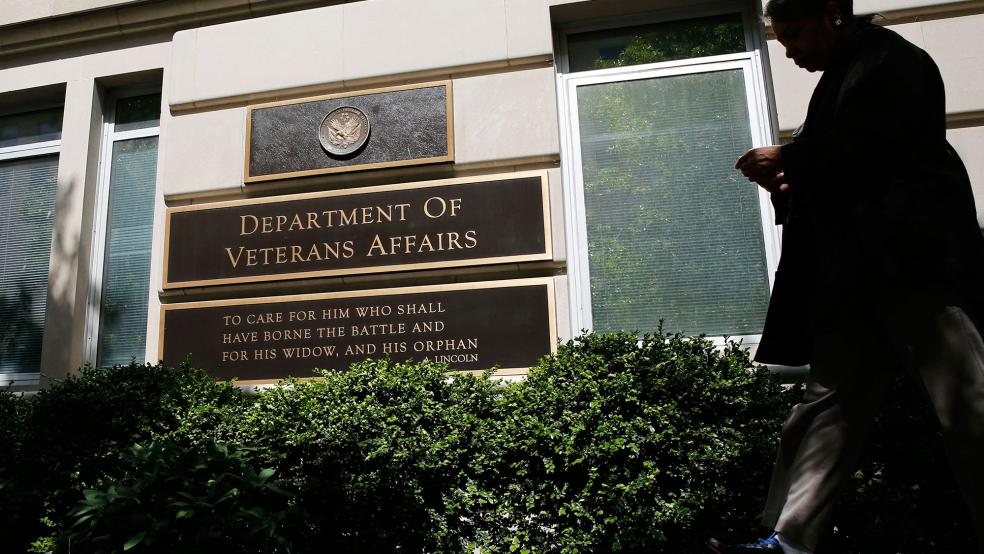Ever since President Obama accepted the resignation of former Veterans Affairs Secretary Eric Shinseki on Friday, lawmakers and advocates have been frantically talking about ways to reform the scandal-ridden VA, under investigation for mismanagement and negligence in at least 45 medical facilities across the country.
On Sunday, Senate Veterans Affairs Committee Chairman Bernie Sanders (I-VT) introduced legislation to overhaul the VA health care system and address reports of altered medical records and long wait times that were confirmed by a preliminary inspector general’s report last week. The auditors concluded that VA primary care wait times at a facility in Phoenix averaged 115 days.
Related: Meet the Independent Watchdog Taking on the VA
“The truth is that when people get into the VA, the quality of care is good. The problem that we have to address is access to the system and waiting lines,” Sanders said on CBS’s Face the Nation.
The Vermont senator’s bill would make it easier for veterans to receive treatment outside of the VA, such as in community hospitals or from private doctors, if they can’t access care in a timely manner. The measure also addresses VA doctor shortages by offering college loan forgiveness to attract medical care providers and requests additional funding to hire more doctors.
The Senate Veterans’ Affairs Committee will hold a hearing Thursday to discuss Sanders’ bill. It’s likely to face resistance from Republicans, however, as it requires additional spending, and right now it’s quite unclear how much the Sanders bill would cost.
A similar VA reform bill, sponsored earlier this year by Sanders, was projected to cost $21 billion over the next decade. It failed to drum up enough GOP support in February, since it included additional spending and extended the eligibility period from 5 years to 10 years after deployment. Republicans said the bill would add more veterans to a system already plagued by backlog and wait times.
Related: Vets Blow the Whistle on Negligent VA Management
GOP lawmakers aren’t likely to support any major increases to the VA’s budget this time, either. The VA, the second largest federal agency behind the Department of Defense and the nation’s largest health care and benefits provider, has an overall budget of $165 billion for fiscal year 2015 – $60 billion of which is for health care.
Meanwhile, House Republicans passed their own bill last month to address the negligence and mismanagement within the VA.
House Veterans Affairs Committee Chairman Jeff Miller (R-FL) introduced the bill after CNN reported that a VA facility in Phoenix was keeping hidden wait lists of veterans seeking medical care. The legislation, which received overwhelming bipartisan support, would give the VA secretary authority to fire officials and executives within the system over performance issues. The measure from Sanders includes a similar provision, though he has some issues with the House bill.
“The nightmare could be under the current bill that passed the House that a new president comes in and they fire hundreds of high-ranking VA officials without due process or particular reason,” Sanders told The Washington Post last week. “I think you cannot run a health care system the size of the VA like that. You want to be able to get rid of people at the VA who are incompetent in a very rapid way, but you have to have due process.”
Rep. Miller is also crafting legislation to make it easier for veterans to get treatment in facilities outside of the VA if they’ve been waiting more than 30 days.
The bills are likely to face an uphill battle in both chambers, where the two parties are at odds over spending and the potential privatization of VA health care.
One obvious idea, mentioned in Forbes, called for Medicare to pick up the care for elderly vets, thus making room for more critical cases from the wars in Iraq and Afghanistan. Although the author didn’t suggest it, a “Vetigap” plan could cover the difference in costs at a much lower rate than some of the other options.
Veterans groups, meanwhile, have their own plan to reform the VA – including some provisions taken from both the House and Senate bills.
On Monday, the Iraq and Afghanistan Veterans of America (IAVA) proposed a handful of ideas, including appointing a post-9/11 veteran to succeed Shinseki as VA secretary. The group supports both Sanders’ provision to increase funding and the House bill to allow the secretary to easily boot out agency officials for performance issues. They’re also calling for Congress to approve more funding for the VA and to partner with nonprofit groups to help “fill in the gaps when the agency is struggling to meet demands.”
The IAVA has been quick to respond to the VA scandal. Just two weeks ago, the group partnered with an independent watchdog firm to create a VA whistleblower website that VA employees, patients and doctors can use to report any wrongdoings they witness at any of the VA facilities across the country.
Top Reads from the Fiscal Times:





